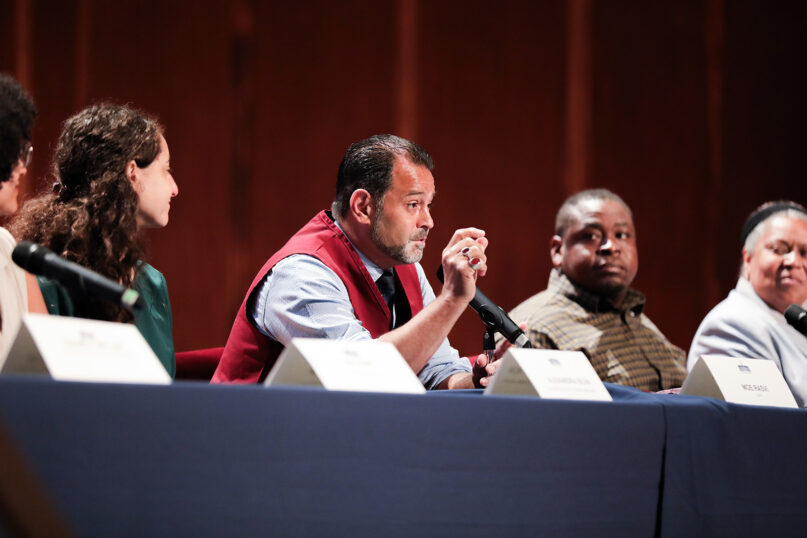NEW YORK (RNS) — About 300 faith leaders and community activists met this week in Manhattan to strategize how religious organizations can better address rising food insecurity in New York City — even as food pantries face federal funding cuts.
On Wednesday morning (Aug. 20), religious leaders from across faiths gathered at the Salvation Army’s Medford Hall for a Food Pantry and Soup Kitchen Summit hosted by the Mayor’s Office of Faith-Based and Community Partnerships, in collaboration with New York Disaster Interfaith Services and the Salvation Army.
The goal of the summit, according to the Office of Faith-Based and Community Partnerships, was to connect different faith-based food pantries and nonprofits across the city to facilitate networking, provide resources and strengthen the city’s response to food insecurity.
“To have faith-based organizations in this space, it’s very important for New York City,” said Pastor Gilford Monrose, a Brooklyn pastor and the executive director of the Mayor’s Office of Faith-Based and Community Partners. “Faith-based food pantries are the drivers. They don’t have a lot of funding. They don’t have a lot of resources, but they are very high on compassion and care for our community.”
RELATED: New York Catholic Workers Bring New Growth With Rooftop Garden
Since February, when the Trump administration suspended the Emergency Food and Shelter Program, resources for faith-based food pantries have grown increasingly scarce. In April, the administration announced plans to cut half of all food shipments through the Emergency Food Assistance Program, a $500 million reduction that affects food banks nationwide. According to the New York governor’s office, these cuts could cost the state roughly 16 million pounds of U.S. Department of Agriculture foods this year, impacting faith-based pantries and soup kitchens in New York that directly rely on those supplies.
Pastor Gilford Monrose, right, speaks at the Food Pantry and Soup Kitchen Summit, Aug. 20, 2025, at Salvation Army’s Medford Hall in New York City. (RNS photo/Fiona Murphy)
Peter Gudaitis, executive director of NYDIS, said the impact of the loss in federal funding is already significant. “One of the big challenges is the Trump administration has eliminated the emergency food and shelter program funding,” Gudaitis said. “A lot of the social service agencies in the city that did have emergency food assistance funding now don’t have that funding anymore.”
He said NYDIS and Islamic Relief USA are planning to open a new food bank in December to help fill the gap, with a focus on smaller, faith-based pantries. The initiative will also provide equipment such as refrigerators so pantries can safely store fresh produce and proteins.
Gudaitis, who distributed a survey to hundreds of faith-based food pantries across the city to gauge their scale and needs, said that even smaller, neighborhood congregations are providing staggering levels of support to the community. “Out of the first 80 or so congregations that responded to our survey, they’re feeding 40,000 people a week. So, if 80 congregations are feeding 40,000 people a week, and we have almost 700 signed up to be here today, you’re talking about millions of meals a year provided through these small pantries.”
Larger faith-based providers, like Holy Apostles Soup Kitchen in Chelsea or the Met Council’s kosher pantry network, feed thousands each week. Together these groups form a substantial portion of New York’s food safety net and feel the strain of rising demand with dwindling resources.
“The government can’t do what these faith-based organizations are doing,” Monrose said. “Government sucks at being compassionate in terms of underground and individuals. That’s the truth. Because if government could have, then we wouldn’t need our partners. They are the ones who really anchor us.”
Approximately 700 congregations across all five boroughs registered to participate in the two-hour summit, which consisted of a presentation and a panel featuring leaders from several food distribution organizations, including Jerome Nathaniel with City Harvest, one of the largest food suppliers in the state; Mohammad Razvi, founder and executive director of the Council of Peoples Organization, which operates one of the largest halal food pantries in Brooklyn; and Tara Walker, an official with the city’s Community Food Connection program, among other nonprofit directors.

Mohammad Razvi participates in n a panel discussion during the Food Pantry and Soup Kitchen Summit, Aug. 20, 2025, at Salvation Army’s Medford Hall in New York City. (Photo by Austin Wideman/Salvation Army)
“Where I used to get six pallets a week from Food Bank for New York City, now I’m only getting two pallets,” Razvi said. Since COVID-19, COPO’s operation has expanded from serving 60 people per week to currently providing food to about 30,000 families. A pallet, a 4-by-4 container used in bulk shipping, can carry more than a thousand pounds of canned or fresh food.
Alongside the food, Razvi said COPO has distributed thousands of “go bags,” or emergency kits prepared in response to heightened fears of U.S. Immigration and Customs Enforcement raids in the city. About 1 in 5 people he serves are immigrants, many of them Muslim, for whom having access to halal food is a necessity. Federal cuts to food pantry funding have pushed Razvi to get more resourceful in order to feed the large population he serves.
Continue reading on the next page


